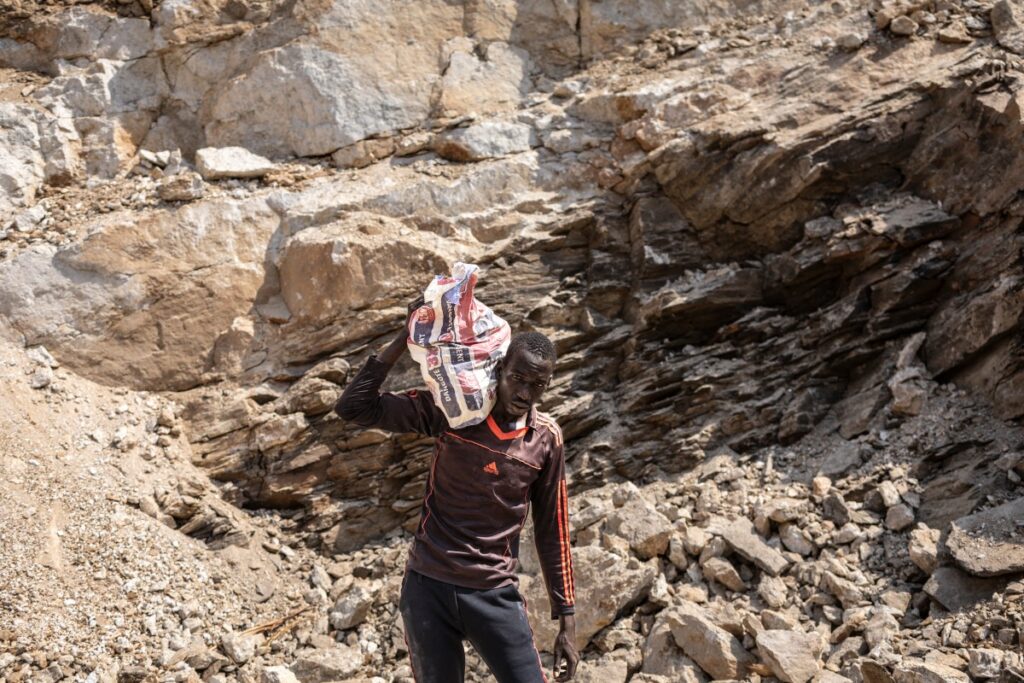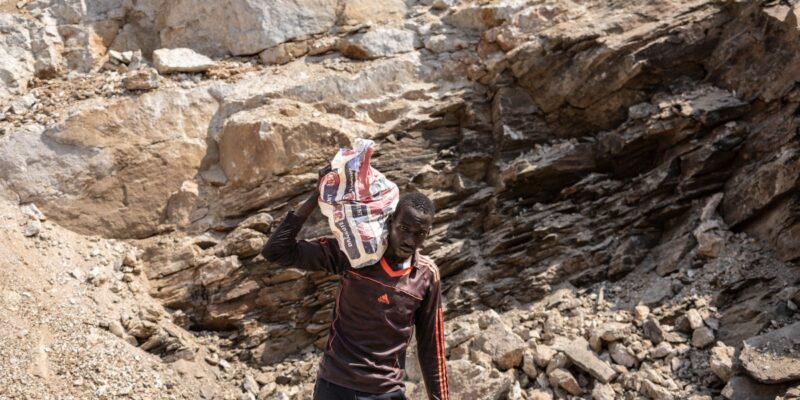
A miner carries on his shoulders a bag full of stones containing lithium at a mining site in Gidan Kwano, in Nasarawa state, on January 23, 2025. In a day’s work, a worker fills three bags of 50 kg each, which earns him 150,000 naira ($100), twice the minimum monthly wage in Nigeria, the most populous country in Africa where more than half the population lives below the poverty line. According to the International Energy Agency (IEA), global demand for lithium will increase forty-fold by 2040, a growth that cannot be met by the current main producers, Australia, China and Chile, alone. (Photo by OLYMPIA DE MAISMONT / AFP)
In the central Nigerian state of Nasarawa, the booming artisanal lithium mining industry is attracting thousands of hopeful miners, drawn by the promise of a fortune from one of the world’s most in-demand metals.
Abdullahi Ibrahim Danjija, a 31-year-old miner, spends his days chiseling away at large blocks of whitish rock in an open-cast mine. By day’s end, he fills three 50-kilogram bags of lithium-bearing material, earning N150,000 ($100) — about twice the country’s monthly minimum wage. His story mirrors that of many other miners in the region who have ventured from across the country to stake their claim in the expanding lithium market.
Lithium is a crucial component in the production of electric batteries and mobile phones, making it highly sought after in the global market. As demand for electric vehicles and renewable energy technology skyrockets, so too does the allure of Nigeria’s lithium-rich lands. However, despite the promise of wealth, the industry remains largely informal, artisanal, and often illegal.
At Gidan Kwano, just a short distance from where Danjija works, another group of miners operate without a permit, laying explosives to carve into the earth and extract the precious material. The miners, though proud of their work, are hesitant to reveal too much, fearing they could attract unwanted attention from authorities cracking down on illegal mining operations.
Artisanal mining in Nasarawa and other parts of Nigeria often bypasses safety and environmental regulations, with little regard for sustainable practices. Miners, including women and children, help process the material by breaking it into smaller chunks for sale to middlemen who then supply it to buyers. In this informal economy, many buyers come from China — the world’s top consumer and refiner of lithium.
One such vendor, Matthew Danbala, a local seller, explains that the influx of lithium has benefited entire communities. “Everybody, children and women, are benefiting,” he says, describing how people collect and sell the rocks for minimal cost, other than their labor.
Foreign companies, especially Chinese firms like Avatar and Ganfeng, are taking advantage of Nigeria’s growing lithium market, setting up local plants to process raw materials. However, concerns about unsustainable mining practices persist, with industry experts like Uba Saidu Malami from the Geological Society of Nigeria urging for more detailed exploration and regulation of mining sites.
“The Chinese are often more focused on quick extraction,” says Malami, criticizing their disregard for environmental sustainability. “They expand extraction without proper planning.”
Beyond the environmental risks, the rapid growth of the lithium sector has also stirred conflict among local communities, mining companies, and even armed groups. As competition intensifies for control over mining sites, tensions have flared, leading to violent clashes and kidnappings. Analyst Charles Asiegbu notes that disputes over resource rights are common in areas where mining operations are poorly regulated, exacerbating social unrest.
As artisanal miners like Danjija continue to dig, the risks of unsafe working conditions, including landslides and explosions, remain ever-present. Local herders and farmers in the area live alongside the miners, often unaware of the constant dynamite blasts that shake the land.
Despite the challenges, the race to tap into Nigeria’s lithium reserves is unlikely to slow down anytime soon — as the stakes in this high-risk, high-reward industry continue to rise.

Comments